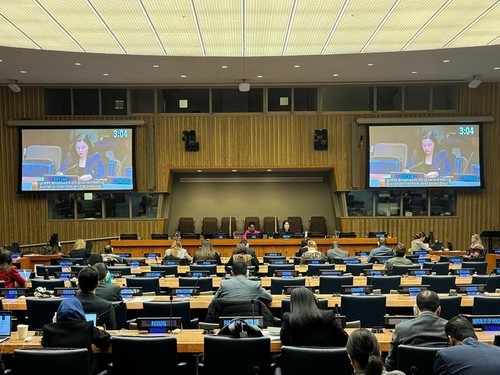 At the 62nd session of the UN Commission for Social Development (CSocD) in New York on February 14, 2024 (Photo: dangcongsan.vn) At the 62nd session of the UN Commission for Social Development (CSocD) in New York on February 14, 2024 (Photo: dangcongsan.vn) |
With the theme “Fostering social development and social justice through social policies to accelerate progress on the implementation of the 2030 Agenda for Sustainable Development and to achieve the overarching goal of poverty eradication”, the meeting drew representatives of UN member states and international organizations.
Social progress, justice are main pillars of sustainable development
Minister Counselor Thoa said Vietnam has implemented policies on education, social security, hunger eradication, and poverty reduction and seen concrete achievements. Vietnam’s multidimensional poverty rate fell from 9.2 to 4.3% in 2022, the average income of poor households increased 230% and the rate of literacy and school attendance rose to 90%.
Promoting social progress and justice is a primary policy of the Communist Party of Vietnam. The Party has been consistent in putting people at the center. Its desire to ensure social progress and justice has been manifested in socio-economic development policies and programs. Vietnam aims to create a prosperous, stable life for all ethnic communities, focus on the disadvantaged in order to leave no one behind, improve social welfare, and narrow the gap between rich and poor.
As a result, Vietnam has reduced gender inequality and shortened the gap between rich and poor with nationwide implementation of the National Target Program for Sustainable Poverty Reduction in the 2021-2025 period, with a focus on poor districts and especially difficult communes in coastal and island areas. Vietnam achieved the Millennium Goal of eliminating extreme poverty and hunger and reducing poverty as the economy grows. Health insurance coverage expanded from 60.9% in 2010 to 94.11% this year. While it has not been able to ensure free education for everyone, Vietnam has focused on eliminating illiteracy, universalizing primary education in 2000 and universalizing lower secondary education in 2010. The number of university and college students has increased 18 fold over the past 40 years.
Implementing social progress, justice in the new context
The consistent views of the Party and State and achievements in social progress and justice are testaments to the goodness of the Vietnamese socialist regime. At its 13th National Congress, the Party acknowledged the need to sustainably manage social development; ensure social progress and justice; implement economic, social progress, and social justice goals; and allocate resources properly to improve social development.
In its economic development policies, Vietnam will continue to focus on ensuring social progress and justice and promoting a social management and development model suitable to the new situation.
Vietnam will continue to implement social incentives and support policies in order to stabilize and improve the quality of life of disadvantaged groups, narrow the gap in living standards, and expand access to resources. Vietnam will help poor and disadvantaged groups get an education and a sustainable livelihood.
Vietnam will improve its forecast of social changes and develop policies suitable to new conditions and context.
Vietnam aims to develop a comprehensive social security system, moving towards universal coverage; reform the multi-tiered social insurance system; implement coordinated, multi-dimensional and sustainable poverty reduction solutions; and guarantee people a minimum standard of living and basic services.
Attaining development and social justice goals will not be easy, but with the right orientation, a determination on the part of all sectors and localities at all levels, and greater international cooperation, Vietnam hopes to gain greater achievements in ensuring social justice.